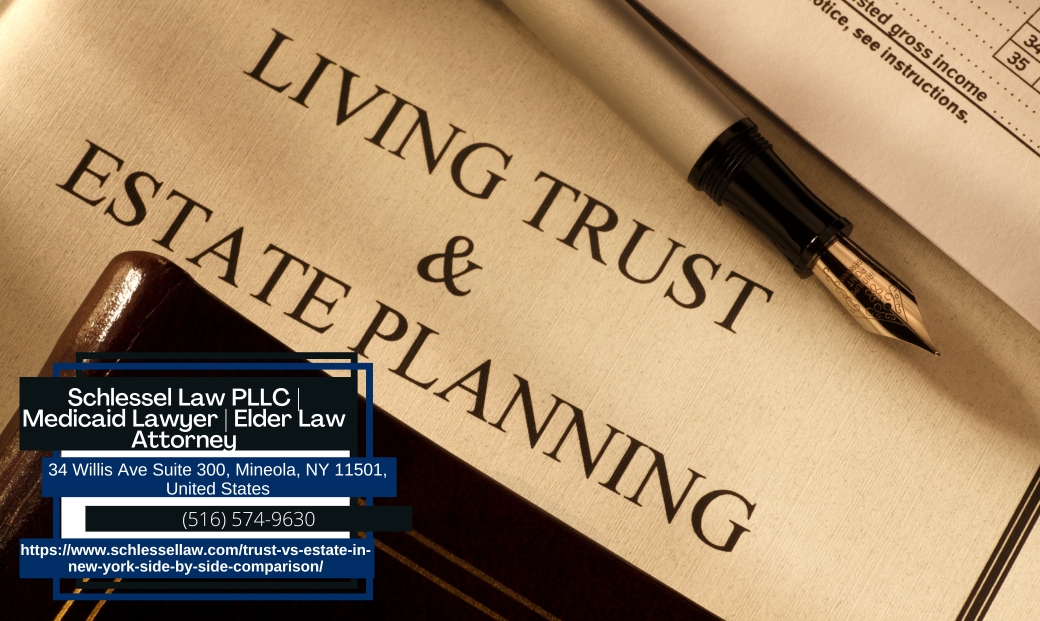Long Island estate planning lawyer Seth Schlessel (https://www.schlessellaw.com/trust-vs-estate-in-new-york-side-by-side-comparison/) offers valuable insights into a crucial legal choice many New Yorkers face: deciding between a trust and an estate plan. In the latest article published by Schlessel Law PLLC, titled “Trust vs. Estate in New York: Side by Side Comparison”, Schlessel outlines the distinct paths individuals can take to manage the transfer of their assets, both during their lifetime and after death.
Understanding the differences between these two legal structures is essential for anyone navigating estate planning in New York. Long Island estate planning lawyer Seth Schlessel explains how a trust allows for asset management both while a person is alive and after their passing, whereas an estate through a will only becomes effective upon death. The decision between a trust and a will can greatly affect privacy, control, and the timeline of asset distribution.
One of the main distinctions discussed by Long Island estate planning lawyer Seth Schlessel is how each tool handles probate. A will typically leads to a probate process, a court-supervised procedure that validates the will and oversees asset distribution. In contrast, assets placed in a trust can bypass probate entirely, resulting in faster, more private, and often less expensive administration. This aspect of planning is particularly relevant in New York, where court delays and procedural requirements can extend the probate timeline.
Trusts and estates serve different legal functions, and each comes with its own benefits. Trusts can operate while a person is still alive and can manage assets in cases of incapacity. They offer greater flexibility, allowing the grantor to set terms such as staggered distributions to beneficiaries or conditional gifts. On the other hand, only a will can be used to appoint guardians for minor children, making it essential for young families. According to Seth Schlessel, “The best approach is always the one tailored to your specific circumstances.”
The article further outlines the types of trusts recognized in New York, including revocable living trusts, irrevocable trusts, and testamentary trusts. Each serves a different purpose depending on the goals of the person creating the trust. For example, irrevocable trusts may be used for Medicaid planning or asset protection, while revocable living trusts are often chosen for flexibility and ease of management.
New York also provides for various estate structures, such as testate estates (when a valid will exists), intestate estates (when there is no will), and small estates eligible for voluntary administration. Each has specific procedural implications, especially in terms of court involvement and the value of the estate.
Seth Schlessel highlights how probate, the legal process for administering a will-based estate, can take several months to over a year. It involves court filings, asset inventories, debt settlements, and final distributions, all under judicial supervision. While probate offers oversight, it also opens up financial details to public record and may lead to delays. In contrast, trust administration often begins immediately upon death or incapacity, without court intervention, and is conducted privately by the designated trustee.
The article explains that while executors and trustees are both fiduciaries with significant responsibilities, their roles differ in scope and duration. Executors manage the estate through probate until the estate is settled, whereas trustees may serve for years or even decades, depending on the terms of the trust.
Choosing between a will-based plan and a trust-centered plan depends on individual goals. Trusts are particularly suitable for those seeking privacy, avoiding multiple probate proceedings, or setting conditions on inheritance. They are also valuable for those with high-value estates, long-term care planning needs, or unique family circumstances such as blended families or special needs beneficiaries.
For individuals with more straightforward financial situations, a will-based estate plan may be adequate. This is especially true for those with smaller estates or younger adults without significant assets. However, even in these cases, Schlessel advises including durable powers of attorney and healthcare proxies to account for potential incapacity.
Estate planning is not just about documents, it’s about making thoughtful choices that reflect one’s wishes and protect loved ones. Seth Schlessel makes it clear that whether the right path involves a trust, a will, or a combination of both, careful planning and legal clarity can significantly ease the burden on heirs and ensure smoother asset transitions.
Anyone looking to understand their estate planning options in New York will find this comparison of trusts and estates a valuable guide. Seth Schlessel and Schlessel Law PLLC aim to help Long Island residents create effective legal strategies tailored to their life circumstances.
For those considering their future plans, the article emphasizes the importance of making informed choices. The differences between a trust and an estate are more than technical—they directly affect family harmony, asset protection, and long-term security. Beginning the process early with guidance from a Long Island estate planning lawyer like Seth Schlessel can help avoid unnecessary complications and delays later.
About Schlessel Law PLLC:
Schlessel Law PLLC serves individuals and families across Long Island, offering guidance in estate planning, trust administration, probate, and related legal matters. Led by Seth Schlessel, the firm is committed to helping clients understand their options and build estate plans that reflect their personal goals and values.
Embeds:
Youtube Video: https://www.youtube.com/watch?v=EtlYiwbaEJg
GMB: https://www.google.com/maps?cid=7387587768064061142
Email and website
Email: seth@schlessellaw.com
Website: http://www.schlessellaw.com/
Media Contact
Company Name: Schlessel Law PLLC
Contact Person: Seth Schlessel
Email: Send Email
Phone: (516) 574-9630
Address:34 Willis Ave Suite 300
City: Mineola
State: New York 11501
Country: United States
Website: https://www.schlessellaw.com/

